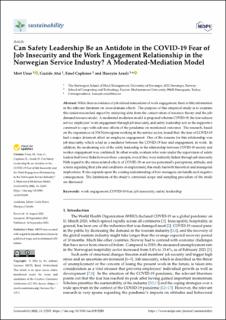| dc.contributor.author | Unur, Mert | |
| dc.contributor.author | Atai, Guzide | |
| dc.contributor.author | Capkiner, Emel | |
| dc.contributor.author | Arasli, Huseyin | |
| dc.date.accessioned | 2023-01-03T06:39:09Z | |
| dc.date.available | 2023-01-03T06:39:09Z | |
| dc.date.created | 2022-11-23T09:40:53Z | |
| dc.date.issued | 2022 | |
| dc.identifier.citation | Unur, M., Atai, G., Capkiner, E., & Arasli, H. (2022). Can Safety Leadership Be an Antidote in the COVID-19 Fear of Job Insecurity and the Work Engagement Relationship in the Norwegian Service Industry? A Moderated-Mediation Model. Sustainability, 14(19), 12203. | en_US |
| dc.identifier.issn | 2071-1050 | |
| dc.identifier.uri | https://hdl.handle.net/11250/3040411 | |
| dc.description.abstract | While there is evidence of job-related antecedents of work engagement, there is little information in the relevant literature on cross-domain effects. The purpose of this empirical study is to examine this under-researched aspect by analyzing data from the conservation of resource theory and the job-demand resource model. A moderated mediation model is proposed wherein COVID-19, the fear reduces service employees’ work engagement through job insecurity, and safety leadership acts as the supportive construct to cope with adverse effects of the pandemic on mentioned outcomes. The research, based on the experiences of 376 Norwegians working in the service sector, found that: the fear of COVID-19 had a major deterrent effect on employee engagement. One of the reasons for this relationship was job insecurity, which acted as a mediator between the COVID-19 fear and engagement, in work. In addition, the moderating role of the safety leadership in the relationship between COVID-19 anxiety and worker engagement was confirmed. In other words, workers who were under the supervision of safety leaders had lower links between these concepts, even if they were indirectly linked through job insecurity. With regard to the stress-related effects of COVID-19 on service personnel’s perceptions, attitude, and actions regarding their jobs and conditions of employment, this study has both theoretical and managerial implications. It also expands upon the existing understanding of how managers can handle such negative consequences. The limitations of the study’s contextual scope and sampling procedure of the study are discussed. | en_US |
| dc.language.iso | eng | en_US |
| dc.publisher | MDPI | en_US |
| dc.rights | Navngivelse 4.0 Internasjonal | * |
| dc.rights.uri | http://creativecommons.org/licenses/by/4.0/deed.no | * |
| dc.title | Can Safety Leadership Be an Antidote in the COVID-19 Fear of Job Insecurity and the Work Engagement Relationship in the Norwegian Service Industry? A Moderated-Mediation Model | en_US |
| dc.title.alternative | Can Safety Leadership Be an Antidote in the COVID-19 Fear of Job Insecurity and the Work Engagement Relationship in the Norwegian Service Industry? A Moderated-Mediation Model | en_US |
| dc.type | Peer reviewed | en_US |
| dc.type | Journal article | en_US |
| dc.description.version | publishedVersion | en_US |
| dc.rights.holder | The author | en_US |
| dc.subject.nsi | VDP::Samfunnsvitenskap: 200 | en_US |
| dc.source.volume | 14 | en_US |
| dc.source.journal | Sustainability | en_US |
| dc.source.issue | 19 | en_US |
| dc.identifier.doi | 10.3390/su141912203 | |
| dc.identifier.cristin | 2078879 | |
| cristin.ispublished | true | |
| cristin.fulltext | original | |
| cristin.qualitycode | 1 | |

